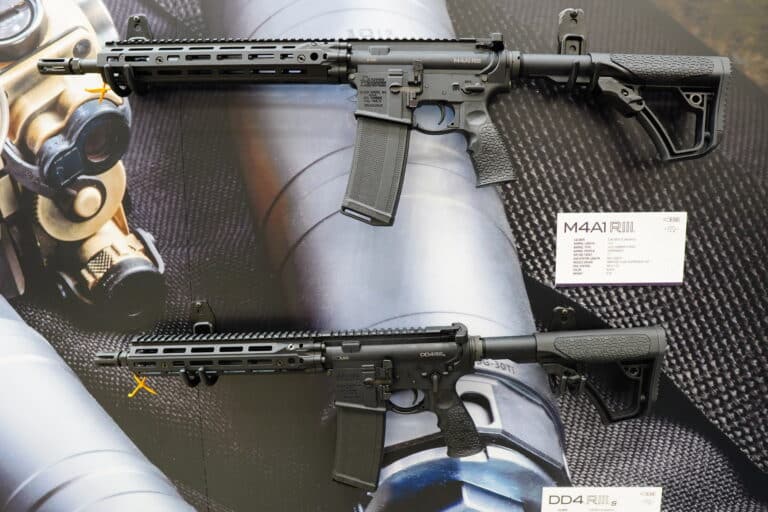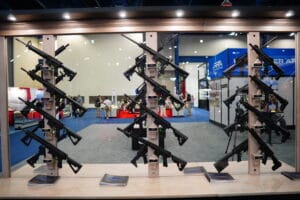The Second Amendment does not protect AR-15s and ammunition magazines capable of holding more than ten rounds, a federal judge ruled on Thursday.
U.S. District Judge Janet Bond Arterton, a Bill Clinton appointee, denied a motion for a preliminary injunction against the state of Connecticut’s ban on the possession and sale of so-called assault weapons and large-capacity magazines (LCMs). She did so after determining that AR-15s and similar rifles, as well as LCMs, are not protected by the Constitution.
“Plaintiffs’ proposed ownership of assault weapons and LCMs is not protected by the Second Amendment because they have not demonstrated that the specific assault weapons and LCMs in the Challenged Statutes are commonly sought out, purchased, and used for self-defense,” Arterton wrote in Flanigan v. Lamont. “In the absence of persuasive evidence that the assault weapons or LCMs listed in the statutes are commonly used or are particularly suitable for self-defense, Plaintiffs have failed to carry their burden.”
The ruling deals a blow to gun-rights advocates looking to challenge hardware bans in the wake of the Supreme Court’s decision in 2022’s New York State Rifle and Pistol Association v. Bruen. The test established by that case, centered on the text of the Second Amendment and the historical tradition of gun regulation in the Founding Era, and the Supreme Court’s decision to grant, vacate, and remand a previous ruling upholding Maryland’s AR-15 ban cast doubt on the viability of such bans. However, challenges to them have produced a mixed record so far. While several federal judges have struck down bans on assault weapons or LCMs, at least five different federal judges have decided they can clear the Bruen test under similar reasonings employed in Flanigan.
Judge Arterton’s analysis of Connecticut’s ban on certain semi-automatic rifles and magazines closely mirrored that of Judge Karin Immergut when she ruled to uphold Oregon’s magazine ban. Both rulings focused on the so-called common use test established by the Supreme Court’s Heller decision, which each judge said the banned weapons failed to pass.
Arterton said there was limited empirical evidence showing that AR-15s and magazines holding more than ten rounds are regularly used in real-world self-defense encounters. Instead, she claimed that such weapons and accessories are more “commonly used” for crime and mass shootings.
“Defendants have submitted persuasive evidence that assault weapons and LCMs are more often sought out for their militaristic characteristics than for self-defense, that these characteristics make the weapons disproportionately dangerous to the public based on their increased capacity for lethality, and that assault weapons and LCMs are more often used in crimes and mass shootings than in self-defense,” she wrote.
Arterton also said that even if she were to determine that the Second Amendment’s plain text covered assault weapons and large-capacity magazines, the historical tradition of gun regulation would support upholding Connecticut’s ban. She said that mass shootings and other violent crimes committed with the banned weapons represent an “unprecedented societal concern” driven by “dramatic technological change.” She argued that means the government of Connecticut only needed to show a historical tradition of regulating weapons for similar reasons to pass muster. Ultimately, she determined that mid-to-late-19th-Century restrictions on the concealed carrying of weapons like Bowie knives and small pistols fit the bill.
“A set of statutes that bans only a subset of each category of firearms that possess new and dangerous characteristics that make them susceptible to abuse by nonlaw abiding citizens wielding them for unlawful purposes imposes a comparable burden to the regulations on Bowie knives, percussion cap pistols, and other dangerous or concealed weapons, particularly when ‘there remain more than one thousand firearms that Connecticut residents can purchase for responsible and lawful uses like self-defense, home defense, and other lawful purposes such as hunting and sport shooting,'” Arterton wrote.
Arterton’s analysis stands in stark contrast to that of judges like U.S. District Judge Stephen P. McGlynn. In April, he issued a preliminary injunction against Illinois’ ban on assault weapons and certain magazines. McGlynn specifically rejected the idea that AR-15s and other semi-automatic rifles are not “in common use for self-defense” and thus outside the scope of the Second Amendment.
“Bruen clearly holds that the Second Amendment protects ‘possession and use’ of weapons ‘in common use’ not just weapons in common use for self-defense as Defendants’ argued,” McGlynn wrote at the time. “Even if there was a requirement that the ‘common use’ of an ‘arm’ be self-defense, AR-15 style rifles would meet such a test considering that 34.6% of owners utilize these rifles for self-defense outside of their home and 61.9% utilize them for self-defense at home.”
He also rejected the use of concealed carry restrictions on certain weapons perceived to be dangerous as valid historical analogues for modern hardware bans.
“The ‘how and why’ of a concealed carry regulation is categorically different than the ‘how and why’ of a ban on possession and cannot pass ‘constitutional muster’ as a historical analogue to demonstrate this Nation’s historical tradition regarding an ‘arms’ ban,” he wrote.
The National Association for Gun Rights, the group challenging Connecticut’s bans, did not respond to a request for comment. The Connecticut State’s Attorney’s Office did not respond to a request for comment either.






